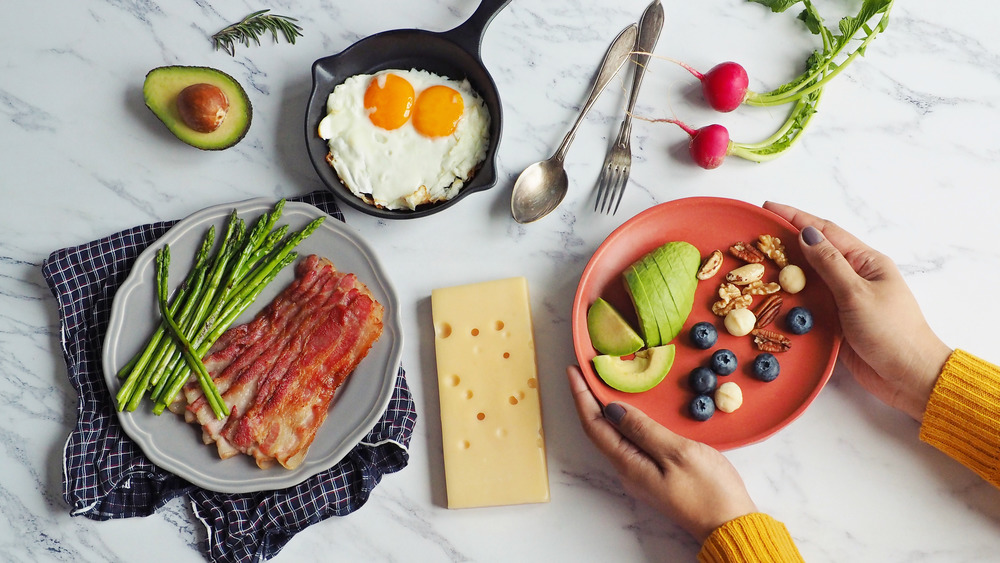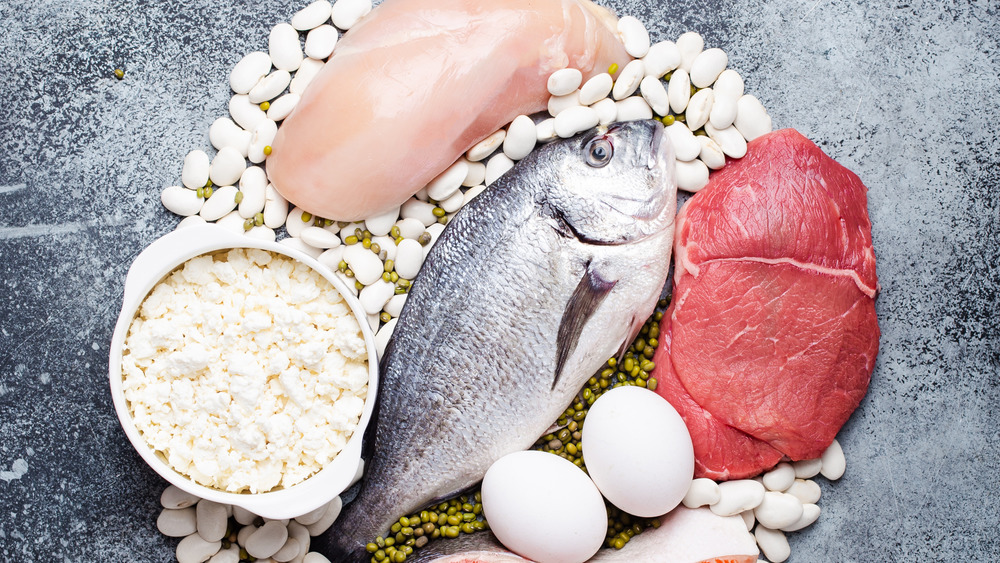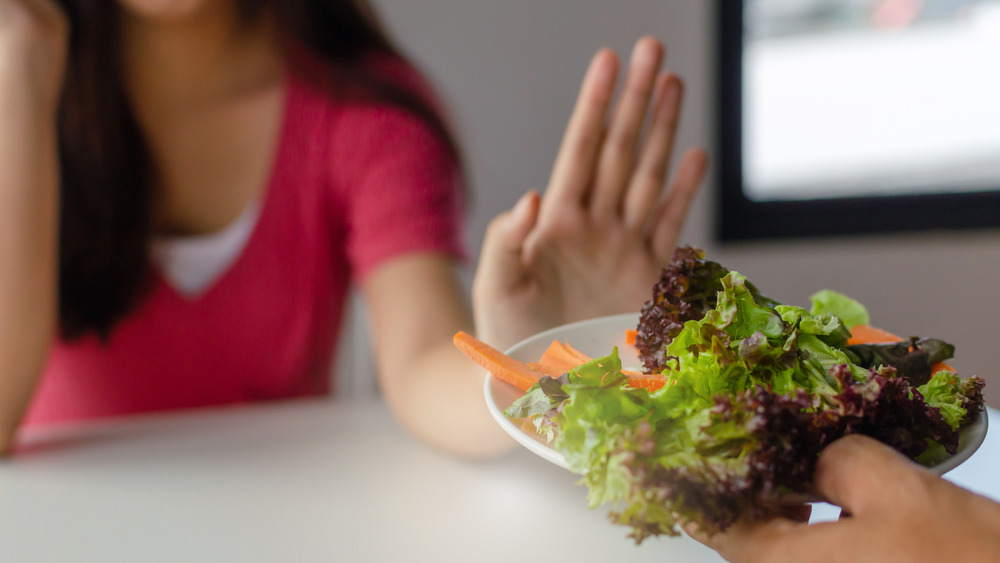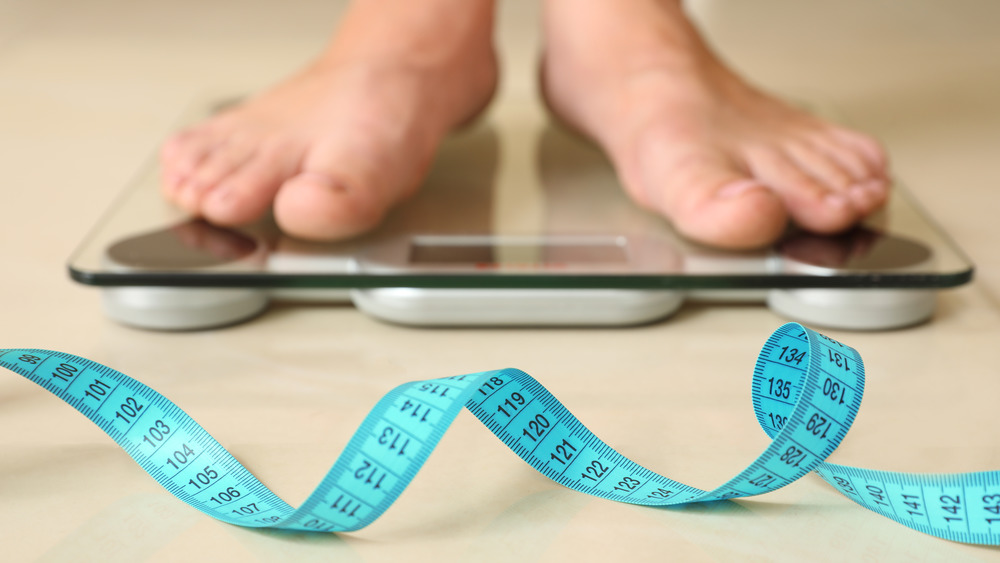Myths About The Keto Diet You've Been Believing
It's not hard to understand why people have been flocking to the keto diet. As Harvard Health reports, many dieters find that the weight melts off pretty quickly. And speaking of things that melt, on the keto diet, you can eat butter! But one thing that is hard to understand is the keto diet itself; the internet is overflowing with myths about this high-fat, low-carb approach to eating.
To get to the bottom of this misinformation, Mashed interviewed Heidi Skolnik, MS, CDN, FACSM, who serves as nutrition consultant for the protein brand Protein2o, and regularly consults with Hollywood A-listers, athletes from the New York Knicks, New York Giants, and Olympians. "The standard ketogenic diet consists of getting 70 percent to 75 percent of your calories from fat, 20 percent from protein, and 10 percent from carbs, which means 20-50 grams a day," Skolnik explained. "This shift causes your body to go into a metabolic state of ketosis, which allows your body to burn fat for fuel rather than carbohydrate." This might sound straightforward enough, but Skolnik said the misconceptions abound. Here are the ones she encounters the most often.
Myth: Keto is a high-protein diet
The keto diet has a lot in common with other low-carb diets in that you're restricting your intake of carbohydrates and pretty much banning simple sugars, too many of which will kick you out of ketosis. But, one difference between keto and other low-carb plans is that the goal is not to have unlimited protein, Skolnik pointed out. "Keto is not high in protein like paleo or Atkins, but is on the higher end of protein recommendations for the general public," Skolnik explained. According to the Centers for Disease Control and Prevention, the average American consumes about 16 percent of their calories from protein, compared to the 20 percent you'd be eating on the keto diet.
Protein-rich foods include animal products like eggs, chicken, fish, and meat, as well as beans, quinoa, and soy-based products, according to Medical News Today. "If you are not accustomed to eating so much protein, you may like incorporating protein powder or protein water into your diet, as a snack or post-workout to recover," Skolnik advised. That being said, these foods aren't the main event on your dinner plate – that role belongs to fat, which you can find in animal products as well, plus oils, nuts, seeds, and avocado (per Healthline).
Myth: You can't eat vegetables on the Keto plan
Vegetables contain carbohydrates; even broccoli has around two net carbs per serving (per Men's Health). If you're trying to stay under 20 to 25 net grams of carbs per day, that salad can add up. But it's actually a very good idea for you to "spend" much of your daily carb allowance on vegetables, according to Skolnik. "Although carbohydrates are very limited on keto (20-50 grams), most green vegetables have less than five grams of carbohydrate per serving (e.g. spinach has one gram per half-cup!) That means you can have four or more servings of leafy greens a day, which is three more than most Americans eat," she explained.
Why eat vegetables instead of, say, a tiny bite of a yummier food that's high in carbs, like a cookie? Skolnik said we need our greens for the environment within our gut, called the microbiome, to remain optimal. "Since carbohydrates may help the microbiome, it is recommended when on keto to include some plant-based protein, along with animal protein, to keep the microbiota healthy." If you don't have the right balance of those healthy bacteria in your digestive tract, you might deal with stomach upset, heart conditions, and other problems, according to WebMD.
Myth: Everyone can benefit from going on keto
Speak to someone who is in the keto honeymoon phase – the pounds are dropping off, the bacon tastes so good – and he or she might try to convince you that you, too, should give it a try. But, the plan isn't ideal for everyone, Skolnik pointed out. For one, many people go through an induction phase, sometimes called the keto flu, which is no joke. "For some, the adaptation can lead to poor side effects, like headaches, poor sleep and fatigue," she explained.
Another issue: burning fat instead of carbohydrates for energy is not ideal for every single dieter, Skolnik added. This is for hard-wired reasons: "Others may not genetically adapt to burn fat as well," she explained. And the lifestyle itself isn't a great fit for everyone, either, Skolnik said. "Some may find the food guidelines helpful, yet many will find it incredibly restrictive and that it interferes with socializing and going out to dinner," she said. So, if you can't imagine life without an occasional pizza dinner or sweet treat, perhaps you should consider another approach to weight loss.



